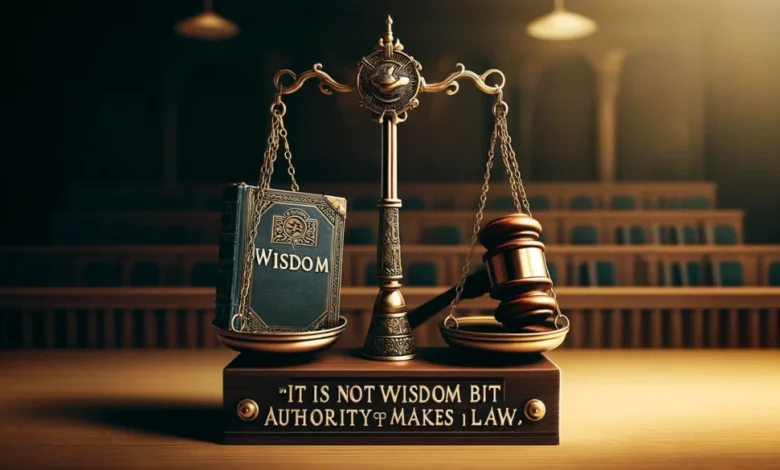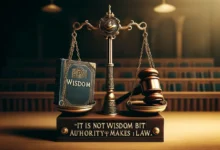It is Not Wisdom but Authority That Makes a Law. T – Tymoff?

In society, laws are the foundation upon which order and justice rest. They define what is acceptable and what is not and outline the consequences for deviations. But an age-old question looms: Are laws truly rooted in wisdom, or are they an extension of authority? This question is encapsulated by the quote, It is Not Wisdom but Authority That Makes a Law. T – Tymoff invites a discussion on whether the essence of law lies in thoughtful judgment or the sheer force of power.
Authority as the Pillar of Law
Authority, in many ways, is the undeniable driver behind the creation and enforcement of laws. Governments, law enforcement, and the judiciary operate based on hierarchical authority, not necessarily on the personal wisdom of each person involved. The effectiveness of law relies significantly on this structure of authority, which ensures compliance from citizens. Without authority, even the wisest laws would hold no weight; they would merely be suggestions rather than mandates.
Authority creates a sense of order and ensures that laws are universally applied. Regardless of personal beliefs or interpretations, authority enforces laws uniformly, allowing society to function predictably. The reliance on authority over wisdom is why laws are enforced, even if individuals or groups may disagree with their underlying reasoning.
The Role of Wisdom in Lawmaking
Though authority is central to establishing and enforcing laws, wisdom plays a crucial role in shaping those laws. Ideally, lawmakers and government officials aim to incorporate ethical, social, and philosophical insights into the legislative process. Wisdom helps to anticipate the long-term impact of laws, ensuring that they benefit society as a whole rather than serving the interests of the few. However, wisdom is a nuanced and subjective concept that varies across cultures, religions, and personal beliefs, making it challenging to apply in legislation universally.
For instance, debates around environmental laws or public health measures reveal the tension between authority and wisdom. Wisdom may dictate that laws are needed to protect the environment, but authority ensures these laws are obeyed, even those prioritizing economic benefits over ecological well-being.
Historical Examples: Authority vs. Wisdom
Throughout history, the interplay between authority and wisdom has been evident in the creation and enforcement of laws. For example, during the Middle Ages, the monarchy or religious authority often dictated laws with little consideration for the general populace’s well-being. Here, authority was absolute, while wisdom or fairness was secondary. Such laws, though strictly enforced, often led to social unrest and inequality, highlighting the potential flaws in authority-based legislation without the guidance of wisdom.
Modern authoritarian regimes often exemplify the dangers of authority-driven lawmaking without wisdom. Laws are created and enforced to maintain the power of a ruling party or individual, frequently disregarding human rights or ethical considerations. This serves as a cautionary reminder that while authority is essential for law enforcement, it can be detrimental when not balanced with wisdom.
Wisdom and the Common Good
One of the strongest arguments for integrating wisdom into lawmaking is its potential to prioritize the common good. Wisdom considers laws’ moral and ethical implications, guiding society toward a just and equitable system. Wisdom-driven laws seek to protect citizens, promote fairness, and prevent harm. They go beyond enforcing obedience; they aim to foster a society in which all individuals have the opportunity to thrive.
Laws centered on wisdom are often the result of rigorous debate, consultation, and compromise among diverse stakeholders. Democratic societies frequently emphasize the importance of representation and public opinion in lawmaking processes, ensuring that laws are informed by the collective wisdom of the people rather than by the mere authority of a ruling body.
The Limitations of Wisdom in Law
While wisdom is a desirable element in law, it has limitations. Wisdom is inherently subjective; what one person or culture deems wise may not align with another’s beliefs. This variance can lead to conflicts and challenges in lawmaking as leaders strive to balance the interests of different groups within society. For instance, laws regarding freedom of speech, religious practices, or marriage rights may be wise for some segments of society but clash with the values of others.
Furthermore, wisdom can be slow to develop. Authority must often take precedence over prolonged deliberation in situations requiring swift action. In times of crisis, such as during natural disasters or national emergencies, immediate action is needed, and there may be little time for extensive reflection or debate on the wisdom of each decision.
Contemporary Reflections on Authority and Law
Today, global discussions surrounding justice, equality, and freedom reflect an ongoing struggle between authority and wisdom in lawmaking. Movements advocating for human rights, environmental protection, and social justice often call for laws rooted in compassion and ethics rather than rigid authority. They emphasize that laws should not only control behavior but uplift society and address deep-rooted inequalities.
At the same time, authority is indispensable in the realm of law. Authority ensures that even laws perceived as wise are consistently applied, helping maintain stability and order. Without authority, even well-meaning laws would lack the enforcement required to make an impact.
Balancing Authority and Wisdom in the Legal System
The challenge, therefore, lies in balancing authority with wisdom within the legal system. Ideally, laws should be crafted through a process that incorporates both the firmness of authority and the foresight of wisdom. Lawmakers must be conscious of the potential effects of their decisions on different segments of society and aim to create enforceable and beneficial laws.
In democratic systems, this balance is often achieved through checks and balances, where different branches of government play distinct roles in law creation, interpretation, and enforcement. This structure allows wisdom and authority to coexist, ensuring that laws serve the people while being enforceable.
Conclusion: Striving for Equilibrium
The quote “It is not wisdom but authority that makes a law. T – Tymoff” highlights a fundamental truth about the nature of law. Authority is the foundation upon which laws are built, giving them the power and legitimacy required for enforcement. However, authority without wisdom can lead to oppression, while wisdom without authority lacks the structure necessary to maintain order.
In a world where justice and fairness are paramount, the goal should be to create laws that combine the power of authority with the insight of wisdom. By striving for this balance, society can ensure that rules are followed, respected and valued by the people they govern. Ultimately, the most enduring and influential laws uphold the principles of authority while embodying the wisdom to serve the common good.

